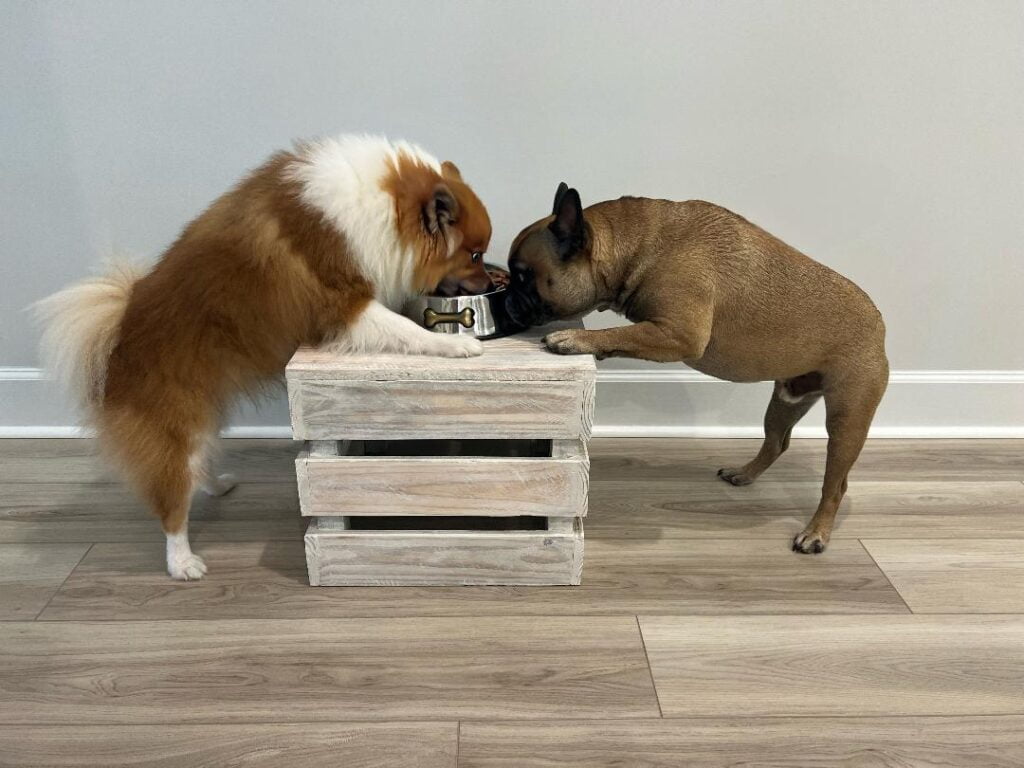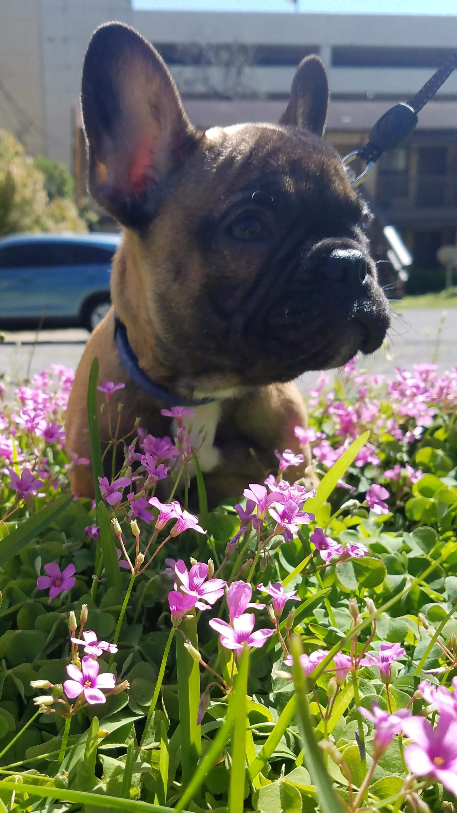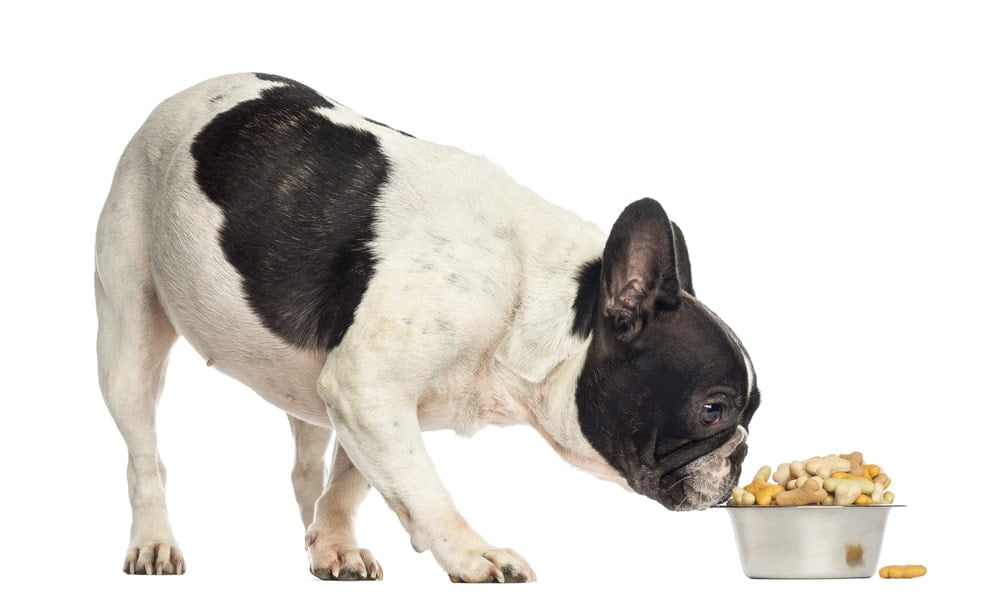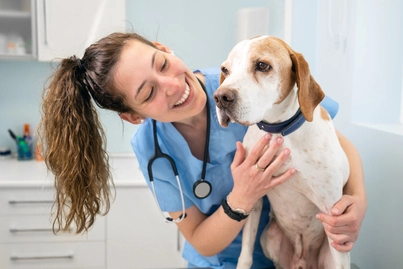Like humans, French Bulldogs can suffer from food allergies. The good news is that with knowledge of symptoms and a proper diagnosis, helping your pup with food allergies can be stress-free.
French Bulldog Food Allergies Versus Food Intolerance
While both food allergies and food intolerance have a negative effect on your body, food intolerance is less severe. Neither are fun, of course, but food allergies are more serious and a lot less pleasant.
The body can react in different ways, namely through an allergy and through an intolerance.
These terms are often used interchangeably. Even though symptoms can be similar, the terms do have different meanings.
Keep reading to find out what the key differences are and what symptoms to be on the lookout for.
What You Need to Know About French Bulldogs Food Allergies
A food allergy is a negative immune system reaction to a consumed ingredient. The ingredient to which the dog reacts to is an allergen, as with other allergies.
In many cases, this is a certain protein such as lamb, beef, chicken, or wheat gluten.
With a food allergy, the body exhibits a hypersensitivity reaction in which the immune system is activated. As a result of this, histamine can be released, which causes the symptoms of an allergy such as itching.

Other Dog Food Allergies
French Bulldogs with food allergies can also react to pork, corn, fish, and rice, but reactions to these foods are much rarer than the foods mentioned above.
Additionally, Frenchies can be allergic to dyes or chemical preservatives and antioxidants such as BHT. Many times a dog is allergic to multiple food components.
What are allergens?
Allergens are antigenic substances that cause allergic reactions in dogs that are sensitive to these substances. It works the same as when a human has an allergy.
When French Bulldogs with food allergies consume one of these substances, their immune system responds abnormally.
When our pets eat food containing the allergen, antibodies react, and symptoms occur.
Symptoms that occur may be itchy ears, paws, diarrhea, and or vomiting. Digestive upset can lead to weight loss.
Environmental allergies can also cause itchy paws and ears. It may be difficult to tell if your dog is allergic to their food or to the pollen outside. If you notice itchy paws and ears instead of digestive problems, make sure to talk to your vet before making big changes.

What You Need to Know About French Bulldogs With a Food Intolerance
With food intolerance, your Frenchie will show signs of hypersensitivity, but the reaction does not involve the immune system.
While food allergies usually have immediate and clear symptoms, an intolerance often involves multiple, vague symptoms. Food tolerance is usually a less severe reaction.
Keep in mind that if a dog has an allergic reaction to food, this is due to your dog’s specific allergies and not a reflection of the food’s quality.
Symptoms
French bulldogs with food allergies have issues that can be expressed through the stomach/intestines and through their skin.
These complaints can also occur in combination. Be aware that symptoms do not always point to a food allergy.
For example, a flea allergy is a much more common cause of skin disorders.
Gastrointestinal Signs
Stomach complaints are seen in approximately 10-15% of French Bulldogs with food allergies.
They can occur in combination with skin complaints, but they can also be stand-alone symptoms.
Gastrointestinal symptoms to look for:
- Vomiting
- Abdominal pain
- Flatulence (gas)
- Diarrhea (or different stool consistency)
- Inflammatory bowel disease (IBD): collective name for various disorders due to chronic intestinal inflammation.
Although food allergy is not the direct cause of IBD, it does play a role because the allergy causes increased permeability of the intestinal wall so that antigens can penetrate the intestinal wall.
- Colitis: Inflammation of the large intestine without an immediately identifiable cause. In certain forms, hypo-allergenic food can reduce the number of anti-inflammatory drugs required in the long term.
While these can definitely be the result of French Bulldog food allergies, they can also be caused by other allergies or other health issues.
Make an appointment with your vet for a proper diagnosis and ensure you get your Frenchie feeling better quickly.
Dermatologic Signs
Pruritus is an uncomfortable, irritating sensation in the skin that causes an urge to scratch. Itching, or pruritus, is the most common symptom of a French Bulldog with a food allergy.
This will cause an unpleasant feeling, and your Frenchie will try to find relief by scratching, biting, or licking the area.
While some dogs have very little itchiness and only show symptoms such as persistent pyoderma and/or external ear infection, others experience more severe pruritus. In severe cases, they will have bite marks that affect a lot of the skin.
The following are possible areas of itchiness:
- The head
- The ears
- The armpits
- The abdomen
- The genitals
- Foot Soles
Secondary Infections
Secondary infections are mainly caused by constant irritation of the skin. This can lead to skin infections, which can be exacerbated by a bacterial infection or a yeast infection.
The skin forms a barrier against harmful external influences. It also regulates body temperature and is a storage place for water and fat.
When the skin is damaged, these processes are disrupted, and the skin, for example, will dry out or start to stink.
If your French Bulldog with food allergies starts scratching or biting itself, the skin will be damaged, and bacteria can enter to cause even more damage.
The resulting skin inflammation (dermatitis) stimulates the skin glands, which will cause extra irritation and spread extra fragrances. Due to this imbalance, all kinds of secondary inflammations and infections can occur.
Of course, every French Bulldog with food allergies will not suffer from secondary infections. Here are some possible secondary infections:
- Pododermatitis: inflammation of the footpad
- Otitis externa: ear infection
- Seborrhea: oily skin due to excessive sebum secretion in combination with many skin flakes
- Erythema: redness of the skin
- Edema: swelling due to the accumulation of moisture in the tissue
- Pyoderma: inflammation of the skin with pus formation
- Alopecia: local baldness
Is It Okay to Let My Frenchie Scratch?
The short answer is no.
Of course, we want our pup to feel relief, but scratching can do more harm than good. While French Bulldogs with food allergies will want to scratch or bite to feel some relief, we don’t want them to do this.
As loving pet owners, their relief is important to us. However, the problem with scratching and biting is that our pup can seriously injure themself and can possibly cause bleeding.
If too much scratching occurs, bald spots are created, and the skin can open up, causing inflammation.
If too irritated, Superficial Pyoderma can occur, causing more skin issues (pimple-like bumps, loss of hair, redness).
Due to the constant irritation, the skin turns black, and pimples are often visible that burst open and form small scabs; this is called a superficial pyoderma.
Diagnosis
While French Bulldogs with food allergies can experience gastrointestinal and skin problems, these issues can have many other causes.
Here are some other likely possible reasons your French is having stomach or skin issues.
- Flea allergy
- Atopia allergy
- Contact with chemicals or household products
- Parasites
- Malassezia dermatitis
See Your Vet!
The most important step to take when your Frenchie is showing the previously mentioned symptoms is to see your vet. The professional always knows best.
Your vet’s diagnosis of the cause of the problem is the best way to get symptoms treated so that your Frenchie can get back to feeling great again.
Connect with a verified veterinarian in minutes. No waiting for appointments or office hours. No high fees. Your pet's health made convenient and worry-free.
When a dog comes to the vet with mainly itching as a complaint, he or she will be the first to rule out things like parasites and fungi. After or in addition, flea treatment will normally be the first to be carried out. If this has little to no effect, an elimination diet is often advised.
There are also vets who prefer to have an atopy test first. However, this test is quite pricey and contains only a part of all possible substances in the environment that the dog can develop an allergy to.
In addition, it is not yet excluded whether food allergies also play a role.
It is typically preferred to start with a hypoallergenic diet (diet with limited ingredients), possibly at the same time as the blood test.
Elimination Diet
The elimination diet is a test diet that contains only foods that the dog has never had before to minimize the risk of an allergic reaction.
Because the food allergy is usually caused by something in the dog’s daily diet, your veterinarian will usually ask which food he is receiving now and what animal protein sources he has had before.
Based on this, it is determined which diet is most suitable for use as an elimination diet.
An elimination diet based on one protein source (and possibly one carbohydrate source) is the most reliable method to determine if your French Bulldog has food allergies because the chance is then made as small as possible to see if your Frenchie reacts to something.
When giving an elimination diet, there are two options, self-prepared food or commercial hypoallergenic food. Both have advantages and disadvantages.
Some veterinarians will recommend commercial food to make sure that the nutrients in the diet are balanced and that the dog will not get any shortages.
These diets contain either only one animal protein source or, in most cases, hydrolyzed proteins. In that case, the protein fractions are reduced so much that the body hardly recognizes them any more.
In turn, the immune system does not respond to an allergic reaction. However, many of these diets do contain chemical antioxidants, such as BHT, that are known to cause allergic reactions.
Therefore, take a good look at the ingredients and consult with your vet.
It is also perfectly possible to prepare a well-balanced diet yourself, but this does require the necessary effort and knowledge. In general, the dog eats the elimination diet for 6-8 weeks. This period is so short, so it should not cause any problems.
Nowadays, it is very easy to follow a raw elimination diet with the help of ready-made fresh meat for dogs from the supermarket or the pet shop. This saves you from getting raw meat from a farm or butcher, and you don’t have to worry about the proportions either.
Keep in mind that before treatment with the elimination diet is started, the secondary infections due to the pruritis must first be treated.
If this is not done, it is more difficult to observe a positive reaction to the diet.
While following this diet, the dog should eat absolutely nothing other than this food. For example, when the dog receives duck meat, it is not allowed to eat dried duck meat from the pet shop.
This is because these dried snacks are generally treated against deterioration, and these preservatives can cause the wrong result.
When the complaints have significantly improved or have disappeared after the end of this diet, one can start to ‘provoke.’ This can be done by slowly adding 1 single ingredient to the dog’s menu (keeping a good record of what he has had and when) and seeing if the issues come back.
The easiest way to do this is to use single frozen meat because this does not contain processed or unknown ingredients, unlike many ready-made chunks and snacks.
Snacks During an Elimination Diet
If you still want to give your dog snacks during the elimination diet without the chance of an unreliable result, you can dry snacks yourself.
You can dry the ready-made frozen meat or raw products of the same kind. This is easy to do yourself.
Some brands of dry food have snacks or wet food to match the hypoallergenic diet. This can possibly be added, but pay attention to the ingredients.
There is a chance that the elimination diet accidentally contains food to which the dog reacts allergically, so if a reaction continues, try a second (different) diet.
Allergies can also change, so there is a possibility that the dog will also become allergic to the hypoallergenic diet at some point. Keep this in mind!
Just like with humans, French Bulldog food allergies can develop or change at any time during their lifetime.
A strongly changing diet increases the chance that the dog becomes allergic to other food components, which causes the problems to return.
Special Tip: Whether you choose dry or raw food, it is advisable to let the dog work for his or her food. Not only does this cause the dog to spend more time on food resulting in better intake, but it also provides mental stimulation.
This is because your Frenchie is required to think and work for its food. There are various ‘brain work’ puzzles and adapted food bowls on the market for this. Check out this Outward Hound Fun Feeder!
Frequently Asked Questions
What are the differences between French Bulldog food allergies and food intolerance?
A food allergy is a negative immune system reaction to a consumed ingredient, where the body exhibits a hypersensitivity reaction in which the immune system is activated, releasing histamine and causing symptoms. Food intolerance is a less severe reaction in which the body shows signs of hypersensitivity, but the reaction does not involve the immune system. Symptoms of food intolerance are often multiple and vague.
What are the common allergens for French Bulldogs?
The most common food allergens in French Bulldogs are proteins, such as lamb, beef, chicken, and wheat gluten. French Bulldogs can also be allergic to pork, corn, fish, rice, dyes, or chemical preservatives and antioxidants such as BHT.
What are the symptoms of French Bulldog food allergies?
French Bulldogs with food allergies can have issues that can be expressed through the stomach/intestines and through their skin. Gastrointestinal symptoms to look for include vomiting, abdominal pain, flatulence, diarrhea, and inflammatory bowel disease. Dermatologic symptoms to look for include itching, redness, and hair loss.
How can I tell if my French Bulldog has a food allergy?
It is best to consult a veterinarian for a proper diagnosis. The vet may recommend an elimination diet or a food trial to determine if your French Bulldog has a food allergy.

